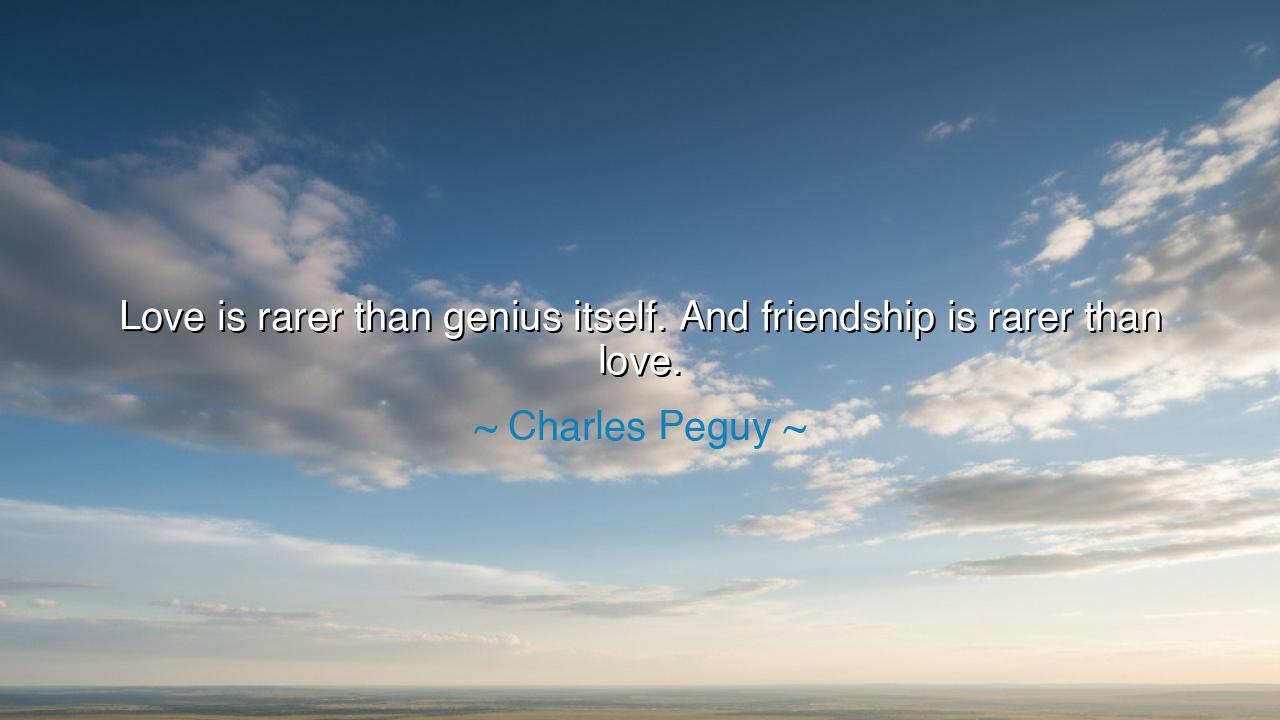
Love is rarer than genius itself. And friendship is rarer than






In the solemn wisdom of Charles Péguy, poet and soldier of France, there resounds a truth that pierces the heart: “Love is rarer than genius itself. And friendship is rarer than love.” These words, though born from the early fires of the twentieth century, are as old as the soul of man. They speak not of the fleeting affections that adorn the surface of life, but of the sacred treasures buried deep within it — those that few ever truly find. Genius, dazzling though it may be, is a spark of intellect; love is a flame of the heart; but friendship, that quiet, enduring fire, is rarer still — for it demands the union of both wisdom and grace, of patience and loyalty, of souls meeting not in desire, but in truth.
Péguy himself lived and died as one who understood the cost of purity in friendship. A man of fierce faith and restless conviction, he walked through the tumult of his age — through wars of politics, belief, and blood — holding fast to the ideal that love of one’s fellow man was sacred. Yet even he, amid the whirl of causes and comrades, saw how seldom friendship endured the tests of pride, ambition, and time. It was this sorrowful insight that gave rise to his words: that while genius may be born of talent, and love may spring from passion, friendship is the rarest of miracles — because it is a choice renewed, again and again, through trial and tenderness.
Think, O listener, of David and Jonathan of old, whose friendship shone brighter than the crowns of kings. Jonathan, son of Saul, loved David though the fates decreed that David would take his father’s throne. Yet he betrayed neither love nor loyalty. He defended his friend at risk of his life, and when they parted upon the fields of battle, Scripture tells us they wept together — not as warriors, but as brothers. Their bond was not made of power or pleasure, but of trust, the purest and most fragile thing known to humankind. And in that ancient friendship, we see the truth of Péguy’s words: such bonds are rarer than all the poets’ sonnets or the scholars’ discoveries.
Why, then, is friendship rarer than love? Because love, in its earliest form, is often born of need — the hunger for comfort, for beauty, for belonging. Friendship, by contrast, asks for no possession, no conquest. It asks only for recognition — the meeting of one soul with another, equal and unmasked. To love is to burn; to befriend is to endure. The lover’s heart may falter in jealousy, but the friend’s heart must remain steadfast through silence, through distance, through the long winters of misunderstanding. It is easier to die for love than to live faithfully for friendship.
History offers us many examples of love that inspired legends — Antony and Cleopatra, Romeo and Juliet — but far fewer tales of friendship that shaped the destiny of men. Yet when we find them, their power endures. Consider the bond between Nikola Tesla and Mark Twain, two men separated by genius but joined by respect and laughter. Twain, wearied by sorrow, found in Tesla’s strange brilliance a renewal of wonder; Tesla, often isolated in his inventions, found in Twain’s humor the warmth of humanity. Their friendship, though unheralded by romance or fame, was a quiet testament to what Péguy meant — that friendship, when true, is a sanctuary for the soul, rarer even than love, for it expects nothing but sincerity.
This, then, is the great paradox of the heart: that we search for love as if it were the ultimate prize, and yet neglect the rarer jewel of friendship, which often asks less and gives more. Friendship does not announce itself with passion’s fire, but it endures where love falters. It demands not beauty or brilliance, but faith — faith that another’s soul is worth standing beside, even when the world grows cold. To find one true friend in life is to touch eternity.
So let this teaching be carved into your heart, as one might inscribe upon stone: seek not many friends, but true ones; love not for need, but for virtue; and when you find a soul whose presence steadies your own, guard that bond as sacred. Do not let distance, pride, or silence corrode what is rare. For in this fleeting world of noise and hunger, the friendship that endures is the highest art — rarer than genius, rarer even than love itself. And if you should be blessed to possess it, know that you hold in your hands the greatest treasure mortal life can give.
Therefore, O seeker of truth, cherish your companions. Speak kindly. Forgive swiftly. Stand beside them when storms rise and others fall away. For when your days grow old and the fires of youth have dimmed, it will not be the brilliance of your mind nor the heat of your passion that sustains you — but the steady light of friendship, that rare and holy flame which, once kindled, never truly dies.






AAdministratorAdministrator
Welcome, honored guests. Please leave a comment, we will respond soon